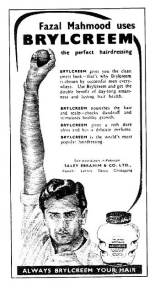
|

Fazal Mahmood: the Pakistan brylcreem boy
© Cricinfo
|
|
The name Fazal Mahmood conjures up much; folklore, legend and awe. His legcutters are the stuff of legend, always extravagant, always moving from leg stump to take the off bail, his metronomic line and length of folklore. and his stamina - he bowled 677 overs on the 1954 tour of England - awe-inspiring.
Many compared him to other names about whom there is as much folklore, legend and awe. Alec Bedser was a contemporary master of cutters, but Frederick "The Demon" Spofforth and Sydney Barnes, who cut with the best of them, were of a different time and era
entirely - when cricket was still prone to statistically freakish occurrences.
Many will also say that Fazal was the first great fast bowler of many that Pakistan produced, maybe the constructor of a legacy which moved from Sarfraz Nawaz to Imran Khan to the two Ws and has now passed on to Shoaib and Sami. In truth, there was little connecting him and the rest.
Modern Pakistani fast bowling, of pace and swing - reverse and conventional - has more to do with Sarfraz and Imran than it does with Fazal's medium-pace cutters. Yes, the confidence, the steadfast belief that any situation could be salvaged, any match won, that coursed through Wasim and Waqar could be traced back to Fazal's conviction (he said of the 1954 Oval game, "even though we were bowled out for 133, I did not think for a second we would lose").
For those who didn't see him play, pictures of him show he was impossibly debonair, with a magnificently thick crop of wavy hair grown as if for the Brylcreem which he went on to model, the bluest of eyes to accompany his filmstar looks. He was Imran Khan before Imran Khan.
There is a picture of him in his recent autobiography, From Dusk to Dawn, with cravat round neck and cigarette in hand, standing alongside the Indian screen legend Raj Kapoor. Even in a photograph, he managed to out-dash the most dapper of actors.
Those who didn't see him play might wonder if he was really that accurate and wholeheartedly committed ... Did his legcutter really, as Frank Tyson once wrote, jump
from leg stump towards the slips regularly? Did it really spin more than Richie Benaud's legspinner, as the man himself claimed? (Ken Barrington, bowled by one such miraculous delivery, was prompted to call him, pint in hand and sorrow in tow, "the bloody greatest").
Well, cold numbers tell a big story: he took 13 five-wicket hauls in just 34 Tests, and he took ten in a match on no fewer than four occasions. A further six times, he ended with four in an innings. Add to that his impressive economy rate - just over two an over - and the picture looks even better.
He played a key role in each of Pakistan's first, and most celebrated, victories. What
is set in stone - in cold, hard numerical fact - is his part in first ensuring Pakistan's entry into Test cricket, and then making it among the most accomplished of any new nation.
Towards the end of 1951, Fazal took 6 for 40 in the first innings for Pakistan against the MCC, leading to victory in an unofficial Test match which sealed Pakistan's promotion to the international stage. Pakistan's first-ever Test victory, at Lucknow, was built on his 12 wickets. Victory at The Oval in 1954 remains Pakistan's greatest moment in Test cricket and, at the centre, with 12 wickets, was Fazal Mahmood. How Bangladesh, also scrapping to eke out an on-field identity and hammered on their first tour of England this week, would have wished for a figure like Fazal.
Thirteen Australian batsmen succumbed to him on their first trip in 1956, at Karachi, on the matting wicket on which he was supposedly lethal. On the run-infested tour of the West Indies in 1957-58, he took eight wickets in Pakistan's first win at Port-of-Spain. When West Indies toured the following year, he took 19 wickets in the first two Tests, including 12 in the second at Dhaka, to ensure Pakistan won the series.
It is impossible to argue against the fact that, with Hanif Mohammad and Abdul Hafeez Kardar for company, he made Pakistan into a Test nation worthy of that status, only five years after the country itself had been traumatically created. At every moment in their early history, he shone among pioneers. More than just Pakistan's first great fast bowler then,
Fazal Mahmood was Pakistan's first true great. And as he departs, he takes with him a significant portion of Pakistan cricket's glorious, heady beginnings.
Osman Samiuddin is a freelance journalist based in Karachi

